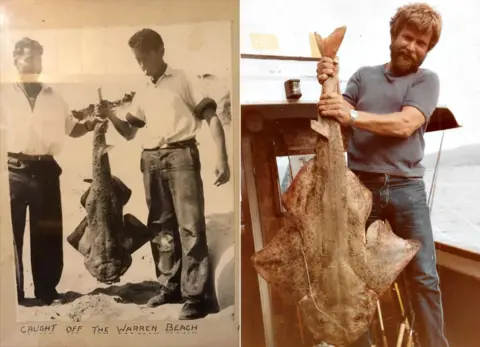Biodiversity: Is Wales an angel shark 'hotspot'?
One of the world's rarest sharks could be living in Wales' seas all year round - and now tests are under way to find out.
Records and sightings suggest there are angel shark around Wales' coast, but no one knows where, when, or how many.
The Angel Shark Project Wales (ASP:W) is testing for DNA at 10 locations for the next 12 months.
The results could show whether Wales is a hotspot for the critically-endangered species.
Numbers in the north-east Atlantic and the Mediterranean have fallen dramatically.
The shark's only known stronghold is the Canary Islands.
The angel shark, which poses no danger to humans, has a flat body, grey skin and can grow up to 1.8m in length and 80kg in weight.
ASP:W co-ordinator, Jake Davies, said: "It's quite exciting to see that Wales is one of those areas within the north-east Atlantic where we still continue to get records of angel sharks every year - and possibly one of those hotspots - which is really exciting here for us off the Welsh coast.
"For the Welsh marine environment it's really positive that we still have this critically-endangered species swimming around the coast."
Over the last two years, the ASP:W - a Natural Resources Wales and Zoological Society of London collaboration - has collected information and anecdotes from coastal communities.
Using funding from the Welsh Government and charity On The Edge Conservation, the project has begun testing water for angel shark DNA at 10 different sites around Cardigan Bay.
If samples hold the DNA - which could be from skin cells or mucus - it means an angel shark has recently been in the area.
 Dai Jones (left) and Charlie Bartlett (right)
Dai Jones (left) and Charlie Bartlett (right)Monthly sampling will continue until next November, after which it is hoped results will show whether the species is present all year.
Mr Davies said the results "could possibly" prove Wales is an angel shark hotspot.
He said: "There's no doubt they're out there, but what are the numbers?
"That's the next question, and whether they're found here all year round or they're just a seasonal visitor."
He said the project would help provide an understanding of the creature and the angel shark could become "the flagship species for the Welsh marine environment".
Once samples are collected, depending on water temperature, scientists have a six-hour window to process them in a lab, before sending them to London for analysis.
